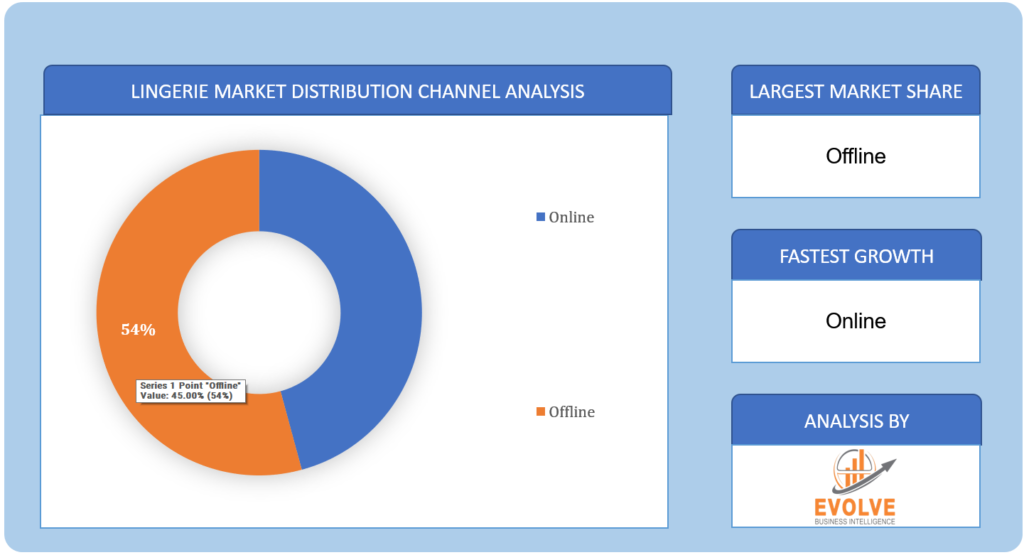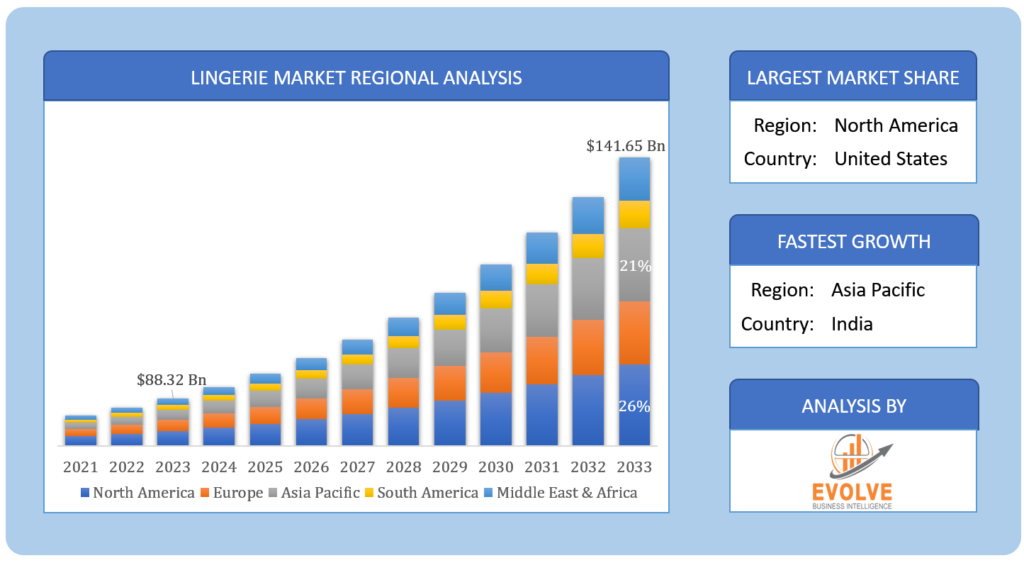Lingerie Market Analysis and Global Forecast 2023-2033
€ 1,230.43 – € 4,886.30Price range: € 1,230.43 through € 4,886.30
Lingerie Market Research Report: Information By Product Type (Briefs, Bras, Shapewear, Others), By Distribution channel (Online, Offline), and by Region — Forecast till 2033
Lingerie Market Overview
The Lingerie Market Size is expected to reach USD 141.65 Billion by 2033. The Lingerie industry size accounted for USD 88.32 Billion in 2023 and is expected to expand at a compound annual growth rate (CAGR) of 6.14% from 2023 to 2033. Lingerie refers to a category of intimate apparel primarily designed for women, typically consisting of undergarments and sleepwear. Lingerie is known for its delicate and alluring designs, often made from lightweight fabrics, lace, satin, silk, or other fine materials. It includes items such as bras, panties, camisoles, corsets, garters, chemises, and nightgowns. Lingerie is worn for various purposes, including comfort, support, and to enhance the wearer’s confidence and sensuality. It is available in a wide range of styles, colors, and sizes, catering to diverse preferences and body types. Lingerie can be functional for everyday wear or designed for special occasions to add a touch of glamour and romance to the wardrobe.
Global Lingerie Market Synopsis
The Lingerie market underwent a profound and transformative shift due to the impact of the COVID-19 pandemic. With widespread lockdowns and restrictions in place to contain the virus, there was a significant shift in consumer behavior and preferences. As people spent more time at home, the demand for comfortable and loungewear-focused lingerie surged, while the demand for more formal and special occasion lingerie declined. Additionally, there was an increasing emphasis on online shopping and e-commerce, as physical retail outlets faced temporary closures. Lingerie brands and retailers had to adapt quickly to these changes, focusing on online marketing, virtual fittings, and personalized shopping experiences. Furthermore, the pandemic also accelerated the trend of sustainability and eco-friendly practices in the lingerie industry, as consumers became more conscious of their purchasing choices. Overall, the COVID-19 pandemic brought about a new set of challenges and opportunities for the lingerie market, shaping its future landscape in terms of consumer preferences, distribution channels, and sustainability efforts.
Lingerie Market Dynamics
The major factors that have impacted the growth of Lingerie are as follows:
Drivers:
Ø Growing emphasis on body positivity and inclusivity
The increasing focus on body positivity and inclusivity in the fashion industry has driven the demand for lingerie that caters to a diverse range of body types and sizes. Lingerie brands that offer a wide range of sizes and styles, designed to flatter various body shapes, have seen a boost in customer loyalty and market growth.
Restraint:
- Economic uncertainties and consumer spending
Economic downturns and uncertainties can impact consumer spending on non-essential items like lingerie. During periods of economic hardship, consumers may prioritize spending on essential items, leading to reduced demand for luxury or high-end lingerie products.
Opportunity:
⮚ Rise of e-commerce and virtual fittings
The rapid growth of e-commerce and technological advancements have provided an opportunity for lingerie brands to offer virtual fittings and personalized shopping experiences. Virtual try-ons and fitting tools help customers make more informed choices, leading to increased online sales and improved customer satisfaction. Brands that invest in digital innovations and customer engagement are likely to gain a competitive advantage in the market.
Lingerie Segment Overview
By Product Type
Based on Product Type, the market is segmented based on Briefs, Bras, Shapewear, and Others. The Briefs segment is projected to experience substantial growth during the forecast period in the Lingerie market due to increasing demand for comfortable and everyday wear lingerie options among consumers.
By Distribution channel
 Based on the Distribution channel, the market has been divided into Online, Offline. Offline stands as the dominant force in the Lingerie Market due to the preference for personalized fittings and the tactile experience of shopping for intimate apparel in physical stores.
Based on the Distribution channel, the market has been divided into Online, Offline. Offline stands as the dominant force in the Lingerie Market due to the preference for personalized fittings and the tactile experience of shopping for intimate apparel in physical stores.
Global Lingerie Market Regional Analysis
Based on region, the global Lingerie market has been divided into North America, Europe, Asia-Pacific, the Middle East & Africa, and Latin America. North America is projected to dominate the use of the Lingerie market followed by the Asia-Pacific and Europe regions.
 Lingerie North America Market
Lingerie North America Market
North America has consistently maintained a dominant position in the Lingerie market due to several key factors. Firstly, the region’s strong economy and high disposable income levels have contributed to a robust demand for premium and luxury lingerie products. Secondly, the fashion-conscious culture and influence of popular media in North America have driven the adoption of diverse lingerie styles and trends, fostering a thriving market for innovative designs and collections. Additionally, the presence of well-established lingerie brands and retailers, along with a sophisticated distribution network, has facilitated easy access to a wide range of lingerie products, catering to different consumer preferences. Furthermore, the increasing emphasis on body positivity and inclusivity in North American society has led to a growing demand for lingerie that caters to various body types and sizes, driving further market expansion. Overall, these factors have combined to establish North America as a dominant force in the global Lingerie market, with sustained growth projected for the foreseeable future.
Lingerie Asia-Pacific Market
The Asia-Pacific region has emerged as a rapidly growing market for the Lingerie industry due to several significant factors. Firstly, the region’s large and diverse population, coupled with increasing disposable incomes and urbanization, has led to a rise in consumer spending on intimate apparel and lingerie products. Secondly, there has been a notable shift in cultural attitudes towards lingerie, with a greater acceptance of lingerie as a fashion statement and a symbol of empowerment and confidence. Additionally, the increasing influence of Western fashion and lifestyle trends, along with the growth of e-commerce and online retail, has made high-quality and fashionable lingerie more accessible to consumers across the region. Moreover, the presence of a burgeoning middle class and a growing preference for premium and luxury lingerie brands have created lucrative opportunities for both local and international lingerie manufacturers and retailers. The combination of these factors has positioned the Asia-Pacific region as a dynamic and thriving market for the Lingerie industry, with significant growth potential in the coming years.
Competitive Landscape
The Global Lingerie market is highly competitive, with numerous players offering a wide range of software solutions. The competitive landscape is characterized by the presence of established companies, as well as emerging startups and niche players. To increase their market position and attract a wide consumer base, the businesses are employing various strategies, such as product launches, and strategic alliances.
Prominent Players:
- Jockey International Inc.
- Victoria’s Secret
- Zivame
- Gap, Inc.
- Hanesbrands Inc.
- Triumph International Ltd.
- Hunkemoller
- Bare Necessities
- Calvin Klein
- MAS Holdings
Key Development
In June 2023, Victoria’s Secret and Amazon Fashion announced a collaboration aimed at enhancing the shopping experience for customers. The partnership will feature a selection of more than 4,000 fashion items from Victoria’s Secret and PINK, encompassing panties, bras, swimwear, loungewear, and sleepwear. Moreover, certain bra and apparel styles will be made available through Amazon Prime’s Try Before You Buy program.
In February 2023, HanesBrands Inc. introduced the Hanes Originals collection, offering a diverse range of innerwear for women, men, girls, and boys, including bras, underwear, T-shirts, and tanks. This collection boasts a fusion of vibrant patterns and colors, along with innovative fabrics, providing customers with a refreshing and appealing selection of innerwear options.
Scope of the Report
Global Lingerie Market, by Product Type
- Briefs
- Bras
- Shapewear
- Others
Global Lingerie Market, by Distribution Channel
- Online
- Offline
Global Lingerie Market, by Region
- North America
- US
- Canada
- Mexico
- Europe
- UK
- Germany
- France
- Italy
- Spain
- Benelux
- Nordic
- Rest of Europe
- Asia Pacific
- China
- Japan
- South Korea
- Indonesia
- Austalia
- Malaysia
- India
- Rest of Asia Pacific
- South America
- Brazil
- Argentina
- Rest of South America
- Middle East & Africa
- Saudi Arabia
- UAE
- Egypt
- South Africa
- Rest of Middle East & Africa
| Parameters | Indicators |
|---|---|
| Market Size | 2033: $141.65 Billion |
| CAGR | 6.14% CAGR (2023-2033) |
| Base year | 2022 |
| Forecast Period | 2023-2033 |
| Historical Data | 2021 |
| Report Coverage | Revenue Forecast, Competitive Landscape, Growth Factors, and Trends |
| Key Segmentations | Product Type, Distribution channel |
| Geographies Covered | North America, Europe, Asia-Pacific, Latin America, Middle East, Africa |
| Key Vendors | Jockey International Inc, Victoria’s Secret, Zivame, Gap, Inc, Hanesbrands Inc, Triumph International Ltd, Hunkemoller, Bare Necessities, Calvin Klein, MAS Holdings |
| Key Market Opportunities | • Expansion of e-commerce and virtual try-on technologies |
| Key Market Drivers | • Growing emphasis on body positivity and inclusivity |
REPORT CONTENT BRIEF:
- High-level analysis of the current and future Lingerie market trends and opportunities
- Detailed analysis of current market drivers, restraining factors, and opportunities in the future
- Lingerie market historical market size for the year 2021, and forecast from 2023 to 2033
- Lingerie market share analysis at each product level
- Competitor analysis with detailed insight into its product segment, Government & Defense strength, and strategies adopted.
- Identifies key strategies adopted including product launches and developments, mergers and acquisitions, joint ventures, collaborations, and partnerships as well as funding taken and investment done, among others.
- To identify and understand the various factors involved in the global Lingerie market affected by the pandemic
- To provide a detailed insight into the major companies operating in the market. The profiling will include the Government & Defense health of the company’s past 2-3 years with segmental and regional revenue breakup, product offering, recent developments, SWOT analysis, and key strategies.
Press Release

Global Pharmaceutical Manufacturing Market to Reach $1.38 Trillion by 2035 with 7.35% CAGR, New Research Shows

The Global Mammography Market Is Estimated To Record a CAGR of Around 10.29% During The Forecast Period

Glue Stick Market to Reach USD 2.35 Billion by 2034

Podiatry Service Market to Reach USD 11.88 Billion by 2034

Microfluidics Technology Market to Reach USD 32.58 Billion by 2034

Ferric Chloride Market to Reach USD 10.65 Billion by 2034

Family Practice EMR Software Market to Reach USD 21.52 Billion by 2034

Electric Hairbrush Market to Reach USD 15.95 Billion by 2034

Daily Bamboo Products Market to Reach USD 143.52 Billion by 2034

Cross-border E-commerce Logistics Market to Reach USD 112.65 Billion by 2034
Frequently Asked Questions (FAQ)
What is the study period of this market?
The study period of the global Lingerie market is 2021- 2033
What is the growth rate of the global Lingerie market?
The Global Lingerie market is growing at a CAGR of 6.14% over the next 10 years
Which region has the highest growth rate in the market of Lingerie?
Asia Pacific is expected to register the highest CAGR during 2023-2033
Which region has the largest share of the global Lingerie market?
North America holds the largest share in 2022
Who are the key players in the global Lingerie market?
Jockey International Inc, Victoria’s Secret, Zivame, Gap, Inc, Hanesbrands Inc, Triumph International Ltd, Hunkemoller, Bare Necessities, Calvin Klein, and MAS Holdings are the major companies operating in the market.
Do you offer Post Sale Support?
Yes, we offer 16 hours of analyst support to solve the queries
Do you sell particular sections of a report?
Yes, we provide regional as well as country-level reports. Other than this we also provide a sectional report. Please get in contact with our sales representatives.
Table of Content
Chapter 1. Executive Summary Chapter 2. Scope Of The Study 2.1. Market Definition 2.2. Scope Of The Study 2.2.1. Objectives of Report 2.2.2. Limitations 2.3. Market Structure Chapter 3. Evolve BI Methodology Chapter 4. Market Insights and Trends 4.1. Supply/ Value Chain Analysis 4.1.1. Raw Material Providers 4.1.2. Manufacturing Process 4.1.3. Distributors/Retailers 4.1.4. End-Use Industry 4.2. Porter’s Five Forces Analysis 4.2.1. Threat Of New Entrants 4.2.2. Bargaining Power Of Buyers 4.2.3. Bargaining Power Of Suppliers 4.2.4. Threat Of Substitutes 4.2.5. Industry Rivalry 4.3. Impact Of COVID-19 on the Lingerie Market 4.3.1. Impact on Market Size 4.3.2. End-Use Industry Trend, Preferences, and Budget Impact 4.3.3. Regulatory Framework/Government Policies 4.3.4. Key Players' Strategy to Tackle Negative Impact 4.3.5. Opportunity Window 4.4. Distribution Channel Overview 12.28. Macro factor 4.6. Micro Factor 4.7. Demand Supply Gap Analysis of the Lingerie Market 4.8. Import Analysis of the Lingerie Market 4.9. Export Analysis of the Lingerie Market Chapter 5. Market Dynamics 5.1. Introduction 5.2. DROC Analysis 5.2.1. Drivers 5.2.2. Restraints 5.2.3. Opportunities 5.2.4. Challenges 5.3. Patent Analysis 5.4. Industry Roadmap 5.5. Parent/Peer Market Analysis Chapter 6. Global Lingerie Market, By Product Type 6.1. Introduction 6.2. Briefs 6.3. Bras 6.4. Shapewear 6.5. Others Chapter 7. Global Lingerie Market, By Distribution Channel 7.1. Introduction 7.2. Online 7.3. Offline Chapter 8. Global Lingerie Market, By Region 8.1. Introduction 8.2. North America 8.2.1. Introduction 8.2.2. Driving Factors, Opportunity Analyzed, and Key Trends 8.2.3. Market Size and Forecast, By Country, 2023-2033 8.2.4. Market Size and Forecast, By Product Type, 2023-2033 8.2.5. Market Size and Forecast, By Distribution Channel, 2023-2033 8.2.6. US 8.2.6.1. Introduction 8.2.6.2. Driving Factors, Opportunity Analyzed, and Key Trends 8.2.6.3. Market Size and Forecast, By Product Type, 2023-2033 8.2.6.4. Market Size and Forecast, By Distribution Channel, 2023-2033 8.2.7. Canada 8.2.7.1. Introduction 8.2.7.2. Driving Factors, Opportunity Analyzed, and Key Trends 8.2.7.4. Market Size and Forecast, By Product Type, 2023-2033 8.2.7.5. Market Size and Forecast, By Distribution Channel, 2023-2033 8.3. Europe 8.3.1. Introduction 8.3.2. Driving Factors, Opportunity Analyzed, and Key Trends 8.3.3. Market Size and Forecast, By Country, 2023-2033 8.3.4. Market Size and Forecast, By Product Type, 2023-2033 8.3.5. Market Size and Forecast, By Distribution Channel, 2023-2033 8.3.6. Germany 8.3.6.1. Introduction 8.3.6.2. Driving Factors, Opportunity Analyzed, and Key Trends 8.3.6.3. Market Size and Forecast, By Product Type, 2023-2033 8.3.6.4. Market Size and Forecast, By Distribution Channel, 2023-2033 8.3.7. France 8.3.7.1. Introduction 8.3.7.2. Driving Factors, Opportunity Analyzed, and Key Trends 8.3.7.3. Market Size and Forecast, By Product Type, 2023-2033 8.3.7.4. Market Size and Forecast, By Distribution Channel, 2023-2033 8.3.8. UK 8.3.8.1. Introduction 8.3.8.2. Driving Factors, Opportunity Analyzed, and Key Trends 8.3.8.3. Market Size and Forecast, By Product Type, 2023-2033 8.3.8.4. Market Size and Forecast, By Distribution Channel, 2023-2033 8.3.9. Italy 8.3.9.1. Introduction 8.3.9.2. Driving Factors, Opportunity Analyzed, and Key Trends 8.3.9.3. Market Size and Forecast, By Product Type, 2023-2033 8.3.9.4. Market Size and Forecast, By Distribution Channel, 2023-2033 8.3.11. Rest Of Europe 8.3.11.1. Introduction 8.3.11.2. Driving Factors, Opportunity Analyzed, and Key Trends 8.3.11.3. Market Size and Forecast, By Product Type, 2023-2033 8.3.11.4. Market Size and Forecast, By Distribution Channel, 2023-2033 8.4. Asia-Pacific 8.4.1. Introduction 8.4.2. Driving Factors, Opportunity Analyzed, and Key Trends 8.4.3. Market Size and Forecast, By Country, 2023-2033 8.4.4. Market Size and Forecast, By Product Type, 2023-2033 8.12.28. Market Size and Forecast, By Distribution Channel, 2023-2033 8.4.6. China 8.4.6.1. Introduction 8.4.6.2. Driving Factors, Opportunity Analyzed, and Key Trends 8.4.6.3. Market Size and Forecast, By Product Type, 2023-2033 8.4.6.4. Market Size and Forecast, By Distribution Channel, 2023-2033 8.4.7. India 8.4.7.1. Introduction 8.4.7.2. Driving Factors, Opportunity Analyzed, and Key Trends 8.4.7.3. Market Size and Forecast, By Product Type, 2023-2033 8.4.7.4. Market Size and Forecast, By Distribution Channel, 2023-2033 8.4.8. Japan 8.4.8.1. Introduction 8.4.8.2. Driving Factors, Opportunity Analyzed, and Key Trends 8.4.8.3. Market Size and Forecast, By Product Type, 2023-2033 8.4.8.4. Market Size and Forecast, By Distribution Channel, 2023-2033 8.4.9. South Korea 8.4.9.1. Introduction 8.4.9.2. Driving Factors, Opportunity Analyzed, and Key Trends 8.4.9.3. Market Size and Forecast, By Product Type, 2023-2033 8.4.9.4. Market Size and Forecast, By Distribution Channel, 2023-2033 8.4.10. Rest Of Asia-Pacific 8.4.10.1. Introduction 8.4.10.2. Driving Factors, Opportunity Analyzed, and Key Trends 8.4.10.3. Market Size and Forecast, By Product Type, 2023-2033 8.4.10.4. Market Size and Forecast, By Distribution Channel, 2023-2033 8.5. Rest Of The World (RoW) 8.5.1. Introduction 8.5.2. Driving Factors, Opportunity Analyzed, and Key Trends 8.5.3. Market Size and Forecast, By Product Type, 2023-2033 8.5.4. Market Size and Forecast, By Distribution Channel, 2023-2033 Chapter 9. Company Landscape 9.1. Introduction 9.2. Vendor Share Analysis 9.3. Key Development Analysis 9.4. Competitor Dashboard Chapter 10. Company Profiles 10.1. Jockey International Inc. 10.1.1. Business Overview 10.1.2. Government & Defense Analysis 10.1.2.1. Government & Defense – Existing/Funding 10.1.3. Product Portfolio 10.1.4. Recent Development and Strategies Adopted 10.1.5. SWOT Analysis 10.2. Zivame 10.2.1. Business Overview 10.2.2. Government & Defense Analysis 10.2.2.1. Government & Defense – Existing/Funding 10.2.3. Product Portfolio 10.2.4. Recent Development and Strategies Adopted 10.2.5. SWOT Analysis 10.3. Gap, Inc. 10.3.1. Business Overview 10.3.2. Government & Defense Analysis 10.3.2.1. Government & Defense – Existing/Funding 10.3.3. Product Portfolio 10.3.4. Recent Development and Strategies Adopted 10.3.5. SWOT Analysis 10.4. Hanesbrands Inc. 10.4.1. Business Overview 10.4.2. Government & Defense Analysis 10.4.2.1. Government & Defense – Existing/Funding 10.4.3. Product Portfolio 10.4.4. Recent Development and Strategies Adopted 10.12.28. SWOT Analysis 10.5. Triumph International Ltd. 10.5.1. Business Overview 10.5.2. Government & Defense Analysis 10.5.2.1. Government & Defense – Existing/Funding 10.5.3. Product Portfolio 10.5.4. Recent Development and Strategies Adopted 10.5.5. SWOT Analysis 10.6. Hunkemoller 10.6.1. Business Overview 10.6.2. Government & Defense Analysis 10.6.2.1. Government & Defense – Existing/Funding 10.6.3. Product Portfolio 10.6.4. Recent Development and Strategies Adopted 10.6.5. SWOT Analysis 10.7. Bare Necessities 10.7.1. Business Overview 10.7.2. Government & Defense Analysis 10.7.2.1. Government & Defense – Existing/Funding 10.7.3. Product Portfolio 10.7.4. Recent Development and Strategies Adopted 10.7.5. SWOT Analysis 10.8 Calvin Klein 10.8.1. Business Overview 10.8.2. Government & Defense Analysis 10.8.2.1. Government & Defense – Existing/Funding 10.8.3. Product Portfolio 10.8.4. Recent Development and Strategies Adopted 10.8.5. SWOT Analysis 10.9 MAS Holdings 10.9.1. Business Overview 10.9.2. Government & Defense Analysis 10.9.2.1. Government & Defense – Existing/Funding 10.9.3. Product Portfolio 10.9.4. Recent Development and Strategies Adopted 10.9.5. SWOT Analysis 10.10. Victoria’s Secret 10.10.1. Business Overview 10.10.2. Government & Defense Analysis 10.10.2.1. Government & Defense – Existing/Funding 10.10.3. Product Portfolio 10.10.4. Recent Development and Strategies Adopted 10.10.5. SWOT Analysis
Connect to Analyst
Research Methodology









